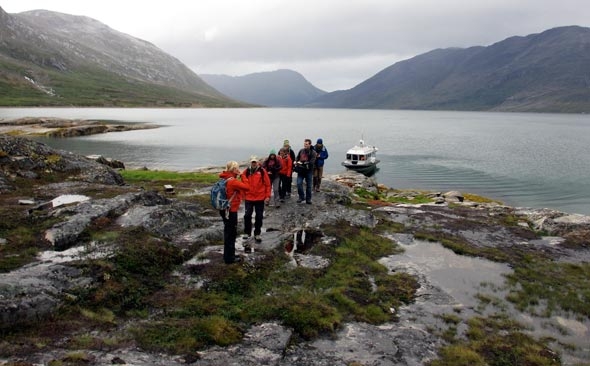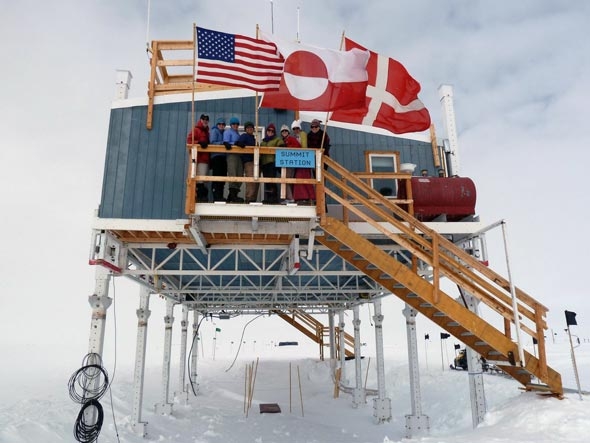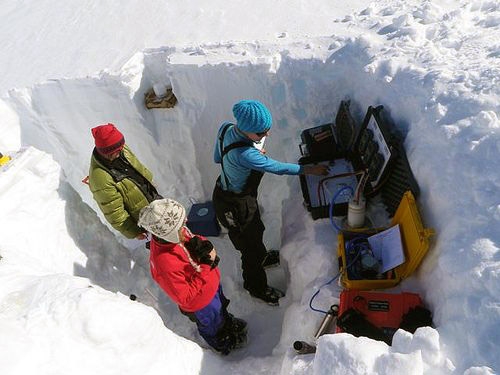With the last group of fellows arriving on campus this fall, one might think things are winding down for Dartmouth’s IGERT program. But in reality, research and collaboration are starting to truly cook now that all of the fellows are on campus.

“We’re really starting to move rapidly,” says Ross Virginia, the Myers Family Professor of Environmental Science and the director of Dartmouth’s Integrative Graduate Education and Research Traineeship program. As IGERT connects research to real world problems, Virginia says, “we’re trying to communicate science in insightful and meaningful ways.”
The program, which studies polar environmental change and supports Arctic research, is funded by a $3 million National Science Foundation grant. Since 2010, the program has facilitated collaboration across departments, conducted research in Greenland, and talked about climate change with diverse audiences—starting a conversation that’s expected to last for years.
IGERT provides two years of funding for PhD students at $30,000 per year. There are a total of 24 fellows—from the fields of engineering, ecology and evolutionary biology, and earth sciences—that connect through IGERT while working toward degrees in their home departments. Fellows take two IGERT core courses, which are taught by professors from different disciplines, and a five-week summer research trip to Greenland that serves as a capstone experience during their first year.
“As interdisciplinary research is needed to address many of the big questions facing scientists today, IGERT training will be valuable for the students’ careers,” says Meredith Kelly, assistant professor of earth sciences and an IGERT faculty member.
As students dig deeper into their research and dissertations, Virginia says, it is energizing to have all the fellows on campus working together. Perhaps nothing promotes teamwork among the fellows more than the field research in Greenland.
“There is nothing else like it,” says Virginia, who is director of the Institute of Arctic Studies at the John Sloan Dickey Center for International Understanding. “There is no better way for students to learn than learning from other students.”

Greenland, with its surplus of daylight hours in summertime, provides an important laboratory in which students get a first-hand look at the effects of Arctic climate change on people and the environment.
Students gain new perspectives working side-by-side with scientists from other fields. For example, ecology students learn from Thayer students about the properties of the snow and ice of the two-mile thick Greenland Ice Sheet. The engineers study the local ecosystem with the student ecologists, taking soil samples, netting caterpillars, and conducting other research on the Arctic tundra.
Alden Adolph ’11, a Thayer PhD student who studies the physical properties of snow, says the fieldwork was an invaluable experience.
“Working with students in other disciplines has helped me to see how intertwined our disciplines actually are,” says Adolph, “particularly as we face the challenge of understanding how our climate will respond to the rapid changes that are now occurring.”
Marcus Welker, a PhD student who studies salmon migration, says it is easy to become immersed in his own research, but IGERT helps him keep global issues in mind. Because of his time in Greenland, Welker says, he is more comfortable approaching students and faculty members from other departments and asking for their insights on his research.
“The most valuable part of IGERT has been the camaraderie and shared experiences of the course work and the field course in Greenland,” says Welker, who recently was awarded an Environmental Protection Agency STAR Graduate Fellowship.

In addition, IGERT students attend seminars, discuss research over lunch with visiting scholars, and organize workshops with other universities to connect their science with a larger community—building bridges between departments and potential research collaborators around the world.
“IGERT is a really important place for community, because of the injection of new perspectives,” says Virginia.
IGERT students also talk about their research before a range of audiences—which have included undergraduates at Dartmouth and elsewhere, a fly-fishing organization, and townspeople at a Greenland cultural center—explaining polar environmental change to academics and non-academics alike.
Even as fellows complete their IGERT coursework, says Lee McDavid, IGERT program manager, they remain involved with the program and its community.
“We have a saying,” McDavid says. “Once an IGERT, always an IGERT.”
This week, Dartmouth Graduate Student Council President and IGERT Fellow Julia Bradley-Cook was presented with the Antarctica Service Medal. Saturday, December 1, is Antarctica Day.
